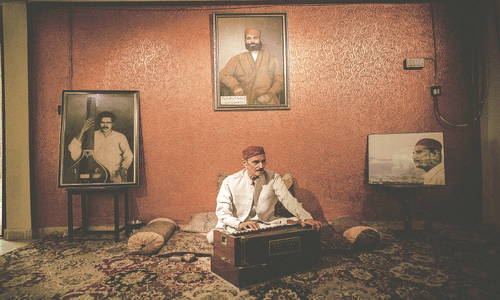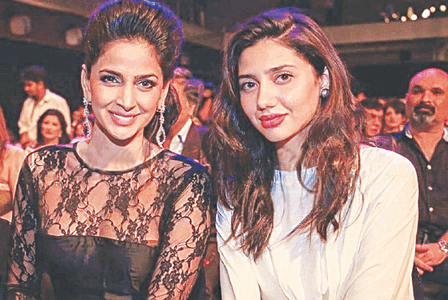Some games achieve a cultural status that goes far beyond their origins.
Be it a personality dead or alive, a landmark building or the author of a not-so-famous book, Kasauti was and still remains the most popular way to guess them all. For over half-a-century, people have been busy playing the game, made famous by the Pakistan Television (PTV) quiz show of the same name.
It is quite likely that even those who don’t understand the word ‘kasauti’ — Urdu for ‘criterion’— connect it solely with the guessing game.
In a span of 20 questions, the dynamic duo of Obaidullah Baig and Iftikhar Arif used to overcome their opponent with their brain games that narrowed down their gues ses with probing questions. Mostly hosted by the late Quraishpur (poet Himayat Ali Shair stepped in for a short period), it was a rage as soon as it began in 1968, changing the way quiz programmes were conducted.
In late 1964, television was introduced in the country. TV successfully completed its pilot phase by Feb 1965. Self-proclaimed Field Marshall Ayub Khan had just defeated Ms Fatima Jinnah in the controversial presidential elections, the economy of the country was soaring on the back of a green revolution, students were boldly active in politics, Pakistan was fighting no wars and pre-1954 Bollywood films were still being screened in cinemas.
The PTV Karachi centre quiz show Kasauti impacted the lives of television viewers in such a way that they played it during o! ce lunch breaks and students preferred to stay indoors to play Kasauti with their classmates during recess and free periods
People in Lahore were getting accustomed to watching moving pictures within the comfort of their homes, where TV was beaming six days a week. In the beginning, the transmission gave Radio Pakistan a run for their money, but the introduction of school broadcasting by radio years prior had managed to attract a lot of students.
With quiz shows such as Cheestan conducted by Mohni Hameed and Abul Hasan Naghmi and Ikeesvaan Sawaal, where Farhad Zaidi used to pitch 20 questions to university students, radio was the perfect example of ‘to inform, to educate, to entertain’, something later adopted by PTV.
Widely known as the father of television in Pakistan, Aslam Azhar borrowed much from radio, and with exposure to the West and his finger on the pulse of the nation, he was aware of what he had to deliver. In the initial years of PTV Lahore, dramas, scientific shows and quiz programmes were aired, and the public, in turn, stayed awake till the end of the transmission. Aslam Azhar also had a knack of spotting and nurturing talent, and groomed many a star for television.
Away from Lahore, around mid-1965, a lad migrated to Karachi after completing his Masters from Lucknow University. Not yet a celebrity poet or scholar, he landed the job of a newsreader in Radio Pakistan. He had two hobbies: one was to search for a better job in the early hours of the day and to read the news on radio by the evening.
Iftikhar Hussain Arif remembers, “Obaidullah Baig was the de facto in-charge of Hindi Service and translated news for the bulletin that I read. Mashood Ahmed and Quraishpur were associated with the Farsi [Persian] service. Obaidullah aka Habib Bhai [Habibullah Baig was his real name] also translated news from the Swahili service. He would not leave for home immediately after and we used to have a rendezvous with the staff of the Farsi service who arrived late.
“As we all had a lot of time to kill, we initiated playing a game, where one had to pick a person/object/place and others had to guess. The loser had to arrange for snacks and hence our game and confidence grew.
“Sometimes we were joined by Ghazi Salahuddin, who would later earn a huge name in journalism. By late 1966, a scripted show that was based on the game we used to play began to air on Radio Pakistan’s Hindi Service. Soon, the 10-minute segment became a hit. Saleem Gilani, the Director of External Services at Radio Pakistan, would join in to play the game, live but fixed, and we were riding high on its success.
“By then, PTV’s Karachi centre had been launched and the rest, as they say, is history,” reminisces Arif, who had arrived in Karachi with just 2,000 rupees in his pocket.
The only surviving member of the original Kasauti show, Arif remembers the details of the show as if it were just yesterday.
“Aslam Azhar, appointed the in-charge of programmes, was looking for new ideas. Saleem Gilani sahib took all three of us to meet him on a Sunday. Saleem Gilani knew about the US quiz show 20 Questions and maybe he developed it into a show. We had to pass a test taken at PTV Karachi centre at Stadium Road. Luckily, we qualified after answering seven of the 10 questions correctly. That was the beginning of Kasauti on PTV, as we were asked to do the programme from the very next day, as Mondays used to be off then.”
Kasauti went on air from PTV in March 1968 and continued, with some breaks, till 1976. Iftikhar Arif, Obaidullah Baig and Quraishpur got jobs in PTV and their connection with radio broke. Until then, Zeena ba Zeena was the only quiz show hosted by Aman Khan Kheshgi on PTV. Kasauti impacted the lives of viewers so much that they started playing it during lunch breaks at work, and students preferred staying indoors despite free periods to play Kasauti with classmates.
The trio soon became celebrities and, many times, Iftikhar Arif and Obaidullah Baig were stopped on the road and were asked to guess personalities by strangers.
Obaidullah Baig’s summarising of the details during the show was in itself a class act but Iftikhar Arif’s style of brushing his hair with his fingers and rotating the ring on his finger got so famous that some believe it even superseded the popularity of the show.
The success of Kasauti gave way to several other similar quiz shows from different PTV centres. These included Ikeesvan Sawaal by journalist Hameed Shaikh; Pehchaaniye, where Aziz Cartoonist would draw for the viewers; Lafz Ki Talaash, a Scrabble-like show by Jahangir Azar; Meezan by Muhammad Idrees; and Parakh by Shoaib Hashmi.
After the change in the country’s political set-up in 1977, Iftikhar Arif sensed what was about to happen. He resigned from PTV and left for the UK. There, he made a name for himself as a poet and an intellectual, joined the Bank of Credit and Commerce International (BCCI) and headed up the Urdu Markaz for over a decade. The Kasauti team had disbanded and the television quiz show returned only after Arif returned to Pakistan in the 1990s, with the return of democracy.
The show was restarted by the name of That’s It on NTM with Obaidullah Baig and Quraishpur. However, Ghazi Salahuddin replaced Iftikhar Arif, who had become too big a name for the game. It is believed that had Ghazi Salahuddin not stepped in Arif’s shoes, on convincing by Baig, an entire generation might have been deprived of the show.
Kasauti’s typical phrases — ‘zinda ya murda?’, ‘mard ya aurat?’, ‘taaluq barr-i-azam Asia se hai?’ [‘alive or dead?’, ‘male or female?’, ‘belongs to the Asian continent?’] — did return to PTV much later, but without Iftikhar Arif. He was busy with jobs as high as heading the Academy of Letters, and being elected as an honorary member of the board of governors of Academy for Persian Language and Literature in Iran.
For his invaluable services in the field of Urdu poetry, Iftikhar Arif has received the Pride of Performance and the highest distinction of the Hilal-i-Imtiaz, but is probably still more widely known and famous for his Kasauti days.
Once, former Prime Minister Nawaz Sharif was set to sign some papers regarding Iftikhar Arif’s appointment to the Pakistan Academy of Letters, when he asked: “Isn’t he the same chap who used to play with his ring during Kasauti?”
Published in Dawn, ICON, July 23th, 2023



































